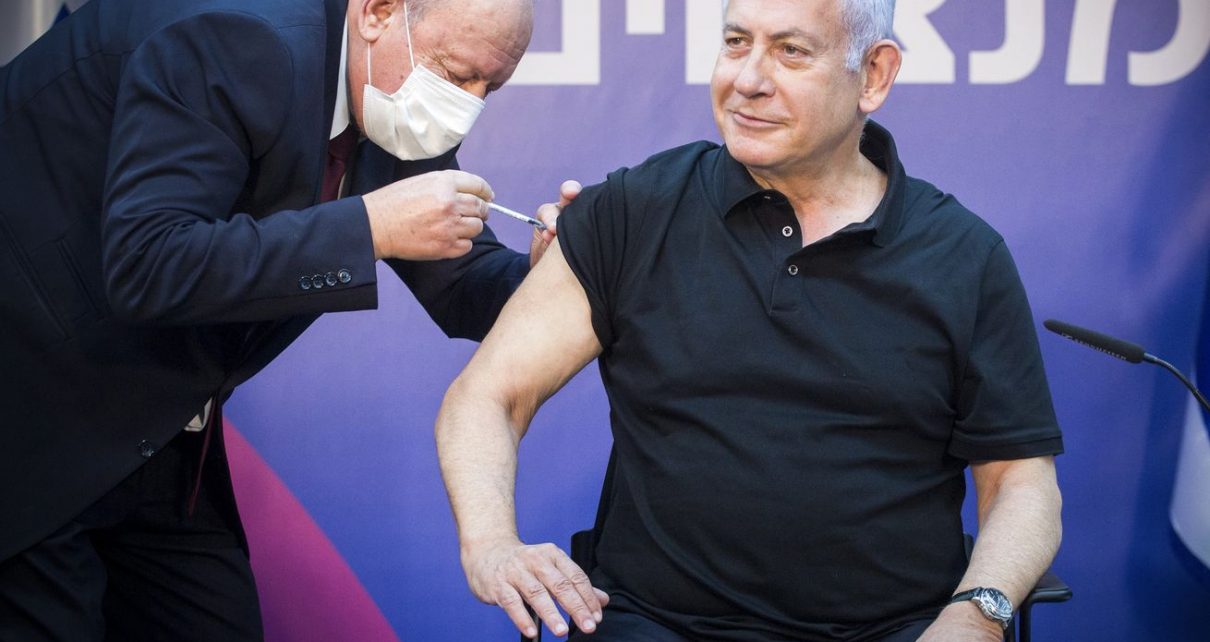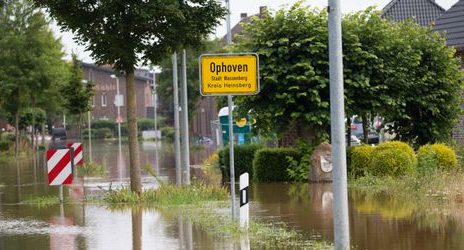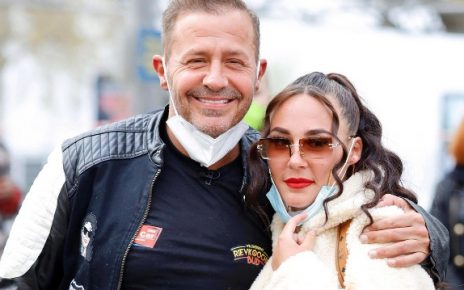
Israel’s vaccination rate is nearly 7 times America’s. Here’s how they did it.
Nurse Elisheva Gasner reports for her shift about twice a week at Jerusalem’s Pais Arena, a sports stadium that has been transformed into a massive Covid-19 vaccination center. Patients arrive at the arena, swipe their insurance cards, and get a number. When their number is called, ushers escort them to vaccine booths where medics, doctors, and nurses like Gasner deliver shots of the Pfizer/BioNTech vaccine into their arms.
“We call it an operation — like an army operation,” Gasner told me last week. “It’s just orderly, and everyone is feeling good and excited.”
Israel leads the world in vaccination rate per capita. It’s been less than a month since its vaccination campaign began on December 19, and more than 20 percent of the country’s population of about 9 million have already gotten the first dose of the Covid-19 vaccine as of January 14. In total, it’s about 2 million people.
Over the past few weeks, the country delivered shots to about 150,000 people per day. Priority went to people over 60 and health workers; however, in an attempt to avoid wasting any shots that might spoil, other Israelis got the vaccine if they happened to know the right clinic or happened to be in the right place at the right time.
Israel’s rapid campaign worked almost too well: The country soon began running low on doses, which threatened to slow the pace of new vaccinations. Israel also committed to reserving a second dose for everyone who received the first. Follow-up appointments are scheduled for 21 days after the first jab, often to the exact day, sometimes the hour.
But on January 7, Israeli Prime Minister Benjamin Netanyahu announced that the country had reached an agreement with Pfizer to deliver more vaccines, with the goal of inoculating all citizens over the age of 16 by the end of March. With more than 70 percent of people over 60 already vaccinated, Netanyahu said Sunday that the campaign would soon expand to include all people 50 and older, and strive for 170,000 inoculations each day.
“We will be the first country in the world to emerge from the coronavirus,” Netanyahu said in a Friday statement about the campaign, called “Operation Getting Back to Life.” The prime minister himself received his second shot on Sunday.
Israel’s small population and existing health infrastructure — a universal, digitized system that makes it easy to keep track of and communicate with patients — have much to do with the country’s vaccination success.
Israel is also facing yet another election in March. An aggressive vaccination rollout will likely be a boost to Netanyahu ahead of that contest, and potentially help overshadow other public health failures that have happened on his watch during the pandemic.
/cdn.vox-cdn.com/uploads/chorus_asset/file/22233746/GettyImages_1230518328.jpg) Motti Millrod/AFP/Getty Images
Motti Millrod/AFP/Getty ImagesBut experts and officials I spoke to said the immunization campaign also benefited from Israel’s ability to react quickly in a crisis. “We are very good in improvising,” Gabi Barbash, a public health expert at the Weizmann Institute and director general emeritus of Israel’s Health Ministry, told me. “Israel is not very good at long-term planning,” Barbash said, but “it’s very good in responding to the immediate challenge.”
Israel’s vaccination efforts are unfolding alongside a rapid increase in coronavirus cases, forcing the country to tighten its nationwide lockdown on January 8 for at least two weeks. Positive Covid-19 cases in the country have reached their highest levels at any point since the start of the pandemic, with around 7,000 people testing positive each day.
It’s an example of the world’s split screen right now: the promise of a vaccine to slow and end the pandemic next to a devastating surge of cases in many parts of the world, in some places driven by a troubling new mutation of the virus.
The precariousness of the moment means Israel can’t claim victory yet. Gasner described it as feeling “a bit strange,” this spike in new cases alongside this undeniable feeling of triumph, of relief. She vaccinated a 100-year-old woman the other day, she told me, and last week, Gasner’s roommate planned to escort her 70-something neighbor to a vaccination appointment at Pais Arena. The neighbor had specifically requested that Gasner give her the shot.
“These people hadn’t left their homes in nine months, and they’re very excited to be able to see their grandchildren, and have human contact,” Gasner said. “They see the light at the end of the tunnel.”
Israel’s health care system provided the infrastructure to make this work
Tali Prilutski, a 23-year-old social work student who works at the Hadassah Medical Center, a major hospital system in Jerusalem, received her first injection of the Pfizer/BioNTech vaccine at the end of December. She called a hotline for workers at the hospital, and they gave her an appointment time — something oddly specific, she recalls, like 2:53 pm.
“I already know when to come back” for the second shot, she said. “The same hour, the same place.” As Prilutski put it, this is the easiest way. People know exactly what comes next and where to go.
A big reason why Israel can do this is because the infrastructure to pull this off already existed.
Israel has a universal health care system: All Israeli citizens are enrolled in one of four health maintenance organizations (HMOs) for their care. The system is digitized, and everyone has an ID number, which allows for easy access to electronic records — and a simple way to find everyone who’s 60 or above, in the current vaccination priority group. This system also allows health care workers to update a person’s vaccination status, monitor any side effects, and schedule an appointment for the next dose.
The HMOs, then, were the most efficient delivery system to get the vaccine out into the communities, employing their nurses, doctors, and other medical professionals to deliver the shots. “The minute [the HMOs] got information from the Ministry of Health on how to give the vaccines, they started organizing the employees and the infrastructure they had on how to do it the best way,” Orna Baron-Epel, a professor of public health promotion at the University of Haifa, told me.
/cdn.vox-cdn.com/uploads/chorus_asset/file/22233767/GettyImages_1230532584.jpg) Jack Guez/AFP/Getty Images
Jack Guez/AFP/Getty ImagesThe HMOs also designated vaccination sites across the country, places that were accessible and big enough to be able to space people out and keep them as socially distanced as possible. Arenas like the Pais, where Gasner worked in Jerusalem, or Rabin Square, in the center of Tel Aviv. Theaters and cultural centers, otherwise empty because of pandemic restrictions, were converted to vaccination sites. Baron-Epel told me about a park in the city of Ra’anana, where an HMO rented a place near an artificial lake so people could wait outside for their shots. The Health Ministry and HMOs also worked to get shots to nursing homes.
Communication has been another key element of the vaccine response: instructing people exactly where to go and when. Experts said Israel’s digitized health system also means patients can use the same information systems they use for primary care to get vaccination information. Israelis are accustomed to getting communications via text message in general, including from the HMOs, which further helped facilitate communication about vaccination.
For older Israelis, who may be less able to navigate the technology, call centers were set up, and in many cases, the local branch of one of the HMOs would directly call residents and tell them when and where to come and vaccinated, according to Asher Salmon, head of the International Relations Department at the Ministry of Health in Israel.
“The idea is that you get vaccinated, and you get vaccinated again, at the same time and same place after three weeks,” Hagai Levine, an epidemiologist at Hebrew University-Hadassah School of Public Health, who plans to stand as a candidate in Israeli’s upcoming election, told me.
“And for that,” he said, “you need people to be informed, you need to have a good communication system, like we do for the hospitals and HMOs that you get through SMS.”
Levine joked that even he had to commit in advance to his second dose, with the nurse telling him, “Sorry, the date is automatically scheduled.” This, he said, worked as a really important nudge to get people to come back for that critical second dose that will provide fuller protection.
But the two-dose regime required for the Pfizer vaccine (and others, like the one from Moderna) does present a real logistical and operational challenge, experts told me. About 100,000 Israelis have already received their second dose, according to the Ministry of Health, but the second wave of injections will be the real test of just how well Israel’s vaccine program is working.
Israel tried to keep things simple yet flexible
Robbie Strazynski started to see the selfies popping up on Facebook of friends declaring their newly vaccinated statuses. The 39-year-old father and founder of a poker blog wanted to know how they did it — how he could get one, too.
They told him that if he went to a vaccination site on a Friday, he might be able to snag a leftover dose, which, if not used by a certain time period, would spoil and be tossed out.
The Pfizer/BioNTech vaccine must be stored at minus 70°C (minus 94°F) or lower, and its delivery requires a complicated “cold chain” to preserve its integrity. Before use, the vaccine must be thawed and refrigerated at 2°C and 8°C (36°F and 46°F) for no more than 120 hours. The vials must then be diluted before they can be administered, and if they’re not used, have to be discarded after 6 hours. That limited shelf life at various stages of the process means it’s basically “use it or lose it.” With the Covid-19 pandemic raging and not even close to enough vaccine supply to meet the worldwide demand, it is the worst kind of waste.
So Strazynski, who lives in the West Bank settlement of Karnei Shomron, went on Friday, January 1, to try to get a vaccine. He was No. 36 in a line of a hundreds. He waited 2½ hours in line to get the vaccine, though he would have waited 12 hours if he had to.
But he did get it. Shortly after, he received a text message with his second-dose appointment three weeks out. “I can actually see this light,” Strazynski told me. “I know exactly where the end of the tunnel is, at least for me.”
Strazynski wasn’t the only one searching for a spare shot. Facebook and WhatsApp groups have cropped up with Israelis sharing tips and advice on how to find leftover vaccines. And while Israel prioritized those over 60, it made the policy flexible enough to avoid as much waste as possible.
“That no-waste policy literally means that the nurse, when she’s got 10 vaccines left, hollers at the pizza guy, or the guy at the bus stop, and says, ‘Hey you, come in and get your vaccine,’” Michal Cotler-Wunsh, a member of the Knesset (Israel’s parliament), told me.
Israel’s health infrastructure makes this kind of organized chaos possible. Even if you’re the pizza guy on the street, or you’re escorting your grandmother to her vaccine appointment and there’s a dose available for you, you’ll quickly be logged into the system and get the same follow-up as everyone else.
“For a vaccination campaign, we are well-prepared, but we’re also flexible,” Levine said. “When you plan, you don’t know, for example, how the cold chain will look, how many vaccines you will get — so you need to make rapid adjustments. And we are good at that.”
Israel wants to be a model for the world. Can it be?
Prime Minister Netanyahu received his second dose of the Pfizer vaccine this weekend, a sort of official kickoff to the next round of vaccinations. Prior to that, he’d announced a deal with Pfizer to receive new shipments of dosages, enough to vaccinate the entire population by March.
The details of the deal with Pfizer are not fully public, and there’s been some criticism that Israel has paid more for doses than other countries. (A spokesperson for Israel’s Ministry of Health declined to comment on record.) According to Politico, in exchange for more doses, Israel will provide information to both the company and the World Health Organization about the side effects experienced by those vaccinated and the vaccine’s efficacy, essentially helping to provide data on the long-term outlook of this Covid-19 immunization campaign.
/cdn.vox-cdn.com/uploads/chorus_asset/file/22233773/GettyImages_1230532305.jpg) Ilia Yefimovich/Picture Alliance/Getty Images
Ilia Yefimovich/Picture Alliance/Getty ImagesIsrael also approved the Moderna vaccine earlier this month, another two-shot regime that was reportedly supposed to be delivered this month.
Netanyahu declared that Israel will be a “global model state for the rapid vaccination of an entire country.” But how much Israel’s success can be replicated abroad is hard to say. Israel’s small and densely packed population has eased some of the logistical and operational challenges of delivering the vaccine. And Israel’s universal health care system, which has easily accessible records for all citizens, has massively facilitated the program.
Many countries where the virus is raging lack one or both of these attributes. The United States, which has struggled with its vaccination rollout, has neither — which is partly why the campaign has, so far, fallen short of its immunization goals. The rollout has been largely delegated to states and localities, which has led to uneven distribution and confusion on the requirements for who gets the jab when — all of which increases the possibility of wastage.
Israel’s rollout has also not been without controversy.
In particular, Israel has faced criticism from human rights groups for excluding Palestinians living in the Israeli-occupied territories of the West Bank and Gaza Strip from the vaccination campaign, despite making the shots available to Israeli settlers in the West Bank.
/cdn.vox-cdn.com/uploads/chorus_asset/file/22233777/GettyImages_1230566343.jpg) Jalaa Marey/AFP/Getty Images
Jalaa Marey/AFP/Getty ImagesIsrael says that based on the terms of the Oslo Accords, the Palestinian Authority is responsible for health care in the Palestinian territories. According to the Guardian, the Palestinian Authority had not asked for assistance early int eh campaign.
But the Palestinian Authority doesn’t have anywhere near the resources Israel does. Though the territories are set to receive doses through the Covax facility, the WHO-linked international consortium, none have begun distribution yet. The Palestinian Authority also approved the Russian vaccine, though doses have not yet arrived.
Human rights and health groups are continuing to pressure Israel to “ensure that quality vaccines be provided to Palestinians living under Israeli occupation,” arguing that restrictions imposed by the occupation limit the Palestinian Authority’s purchasing and distribution capabilities.
And of course, Israel’s vaccination campaign can’t be at all divorced from politics. The Israeli governing coalition collapsed in December, leading to yet another election in March of 2021, the fourth in two years. A successful vaccination campaign, one that’s a world model, is undoubtedly a boost for Netanyahu, who can claim victory despite Israel’s larger struggle to control the pandemic and the prime minister’s own corruption scandals.
It might be that the last memory — this aggressive vaccination campaign — is the one that will stick with Israelis. “I think this, in a way, is going to amend for all mismanagement that we have seen over the course of the pandemic,” Barbash, the public health expert, said.
“But,” he added, “to be honest and fair: When you look, there is no one nation in the world that has been able to cope with this pandemic.”





